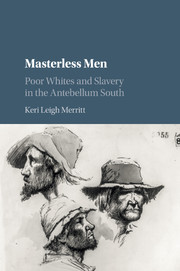Crossref Citations
This Book has been
cited by the following publications. This list is generated based on data provided by Crossref.
Chacon, Mario L
and
Jensen, Jeff l.
2016.
The Institutional Determinants of Southern Secession.
SSRN Electronic Journal,
HALL, ANDREW B.
HUFF, CONNOR
and
KURIWAKI, SHIRO
2019.
Wealth, Slaveownership, and Fighting for the Confederacy: An Empirical Study of the American Civil War.
American Political Science Review,
Vol. 113,
Issue. 3,
p.
658.
Steele, Brent J.
2019.
Restraint in International Politics.
White, Steven
2019.
Race and Southern Political Development.
The Journal of Politics,
Vol. 81,
Issue. 2,
p.
e27.
Suryanarayan, Pavithra
and
White, Steven
2019.
Slavery, Reconstruction, and Bureaucratic Capacity in the American South.
SSRN Electronic Journal,
Cade, Anthony J.
2020.
Why they fought: the initial motivations of German American soldiers who fought for the Union in the American Civil War.
European Review of History: Revue européenne d'histoire,
Vol. 27,
Issue. 1-2,
p.
65.
Redecker, Eva von
2020.
Ownership's Shadow.
Critical Times,
Vol. 3,
Issue. 1,
p.
33.
Uttermark, Matthew J
2020.
What Determines Social Capital? Evidence from Slavery’s Legacy in the United States and Brazil.
Social Forces,
Vol. 98,
Issue. 4,
p.
1773.
Logan, Trevon D.
2020.
Do Black Politicians Matter? Evidence from Reconstruction.
The Journal of Economic History,
Vol. 80,
Issue. 1,
p.
1.
Müller, Viola Franziska
2020.
Early undocumented workers: runaway slaves and African Americans in the Urban South, c. 1830-1860.
Labor History,
Vol. 61,
Issue. 2,
p.
90.
Chacón, Mario L.
and
Jensen, Jeffrey L.
2020.
The Political and Economic Geography of Southern Secession.
The Journal of Economic History,
Vol. 80,
Issue. 2,
p.
386.
Logan, Trevon
and
Temin, Peter
2020.
Inclusive American Economic History: Containing Slaves, Freedmen, Jim Crow Laws and the Great Migration.
Institute for New Economic Thinking Working Paper Series,
p.
1.
Sudo, Jonathan K.
2021.
The Accumulation of People: Slavery and Capitalism in Southern Thought.
Swarthmore Undergraduate History Journal,
Vol. 2,
Issue. 2,
p.
102.
Hirsch, Jason
and
Schwartz, Robert
2021.
Structural Conditions as Cause: Explaining the Rapid Rise in Youth E-Cigarette Use by Re-thinking Models of Addiction.
Substance Use & Misuse,
Vol. 56,
Issue. 12,
p.
1892.
Swanson, Drew
2021.
Go Tell It on the Mountain.
Environmental History,
Vol. 26,
Issue. 1,
p.
9.
SURYANARAYAN, PAVITHRA
and
WHITE, STEVEN
2021.
Slavery, Reconstruction, and Bureaucratic Capacity in the American South.
American Political Science Review,
Vol. 115,
Issue. 2,
p.
568.
Masera, Federico
and
Rosenberg, Michele
2021.
Slavocracy: Economic Elite and the Support for Slavery.
SSRN Electronic Journal ,
Milliman, Scott
2021.
Racial Exclusion in the Antebellum North: An Analysis of Indiana's 1851 Vote to Ban African American Immigration.
Social Science Quarterly,
Vol. 102,
Issue. 4,
p.
1255.
Rönnbäck, Klas
2021.
Were slaves cheap laborers? A comparative study of labor costs in the antebellum U.S. South.
Labor History,
Vol. 62,
Issue. 5-6,
p.
721.
Sandy, Laura R.
2021.
Slave stealing women, slave-owning women, and stolen slaves in the American South.
American Nineteenth Century History,
Vol. 22,
Issue. 3,
p.
271.





